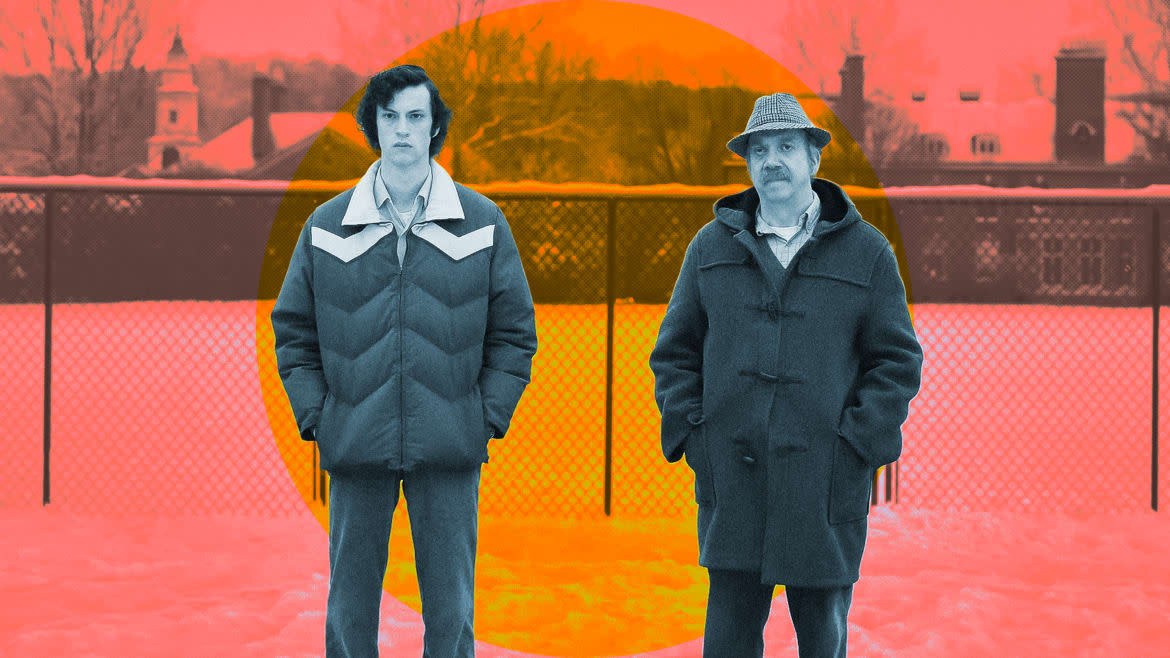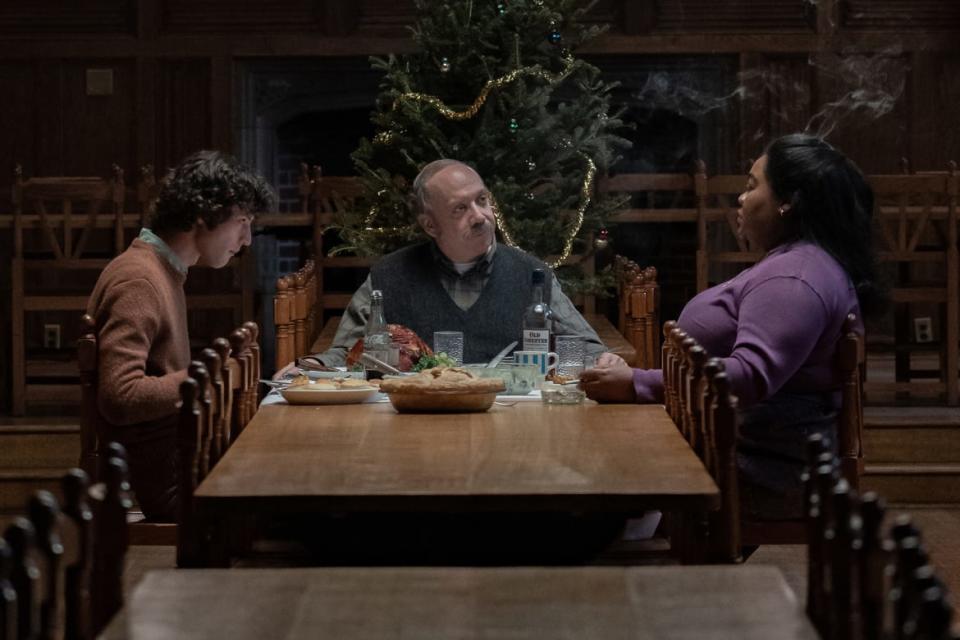Why Everyone Needs to Go See ‘The Holdovers’

- Oops!Something went wrong.Please try again later.
- Oops!Something went wrong.Please try again later.
- Oops!Something went wrong.Please try again later.
This is a preview of our pop culture newsletter The Daily Beast’s Obsessed, written by editor Kevin Fallon. To receive the full newsletter in your inbox each week, sign up for it here.
To quote the most influential keeper of the calendar that we have as a society, Mariah Carey, “It’s tiiiiiiime.”
The clock had just struck midnight on Nov. 1 when America’s only true royal—the Queen of Christmas—posted a video on social media of her in a block of ice wearing a festive gown, defrosting. As the familiar xylophone twinkles that open “All I Want for Christmas Is You” plunked, she burst free, as official a declaration as there can be that the holiday season has begun.
It’s…… TIME!!! 🎃🧊🎄 #MariahSZN pic.twitter.com/dp6xEs7LTT
— Mariah Carey (@MariahCarey) November 1, 2023
The start of the holidays, at least for me, also means “it’s tiiiiiime” for something else: to be crying all the damn time.
Look, I don’t make the rules. I didn’t design the human body and the ridiculous, frustrating ways it processes and displays emotion. So, as much as I don’t know why we need oxygen to breathe or why whenever I hear someone cough, I then have to cough too, I also don’t know why so many of us spend the months of November and December in a permanently weepy state. But sniffles are as much a soundtrack to the season as sleigh bells and Santa’s ho-ho-hos. I find it necessary to embrace this reality and, in fact, even enjoy it. That’s why I recommend that everyone start out his holiday season in the perfectly melancholy way: by going to the movies and watching the new film The Holdovers.
The Holdovers opened last weekend in limited release and goes wide on Nov. 10, which gives everyone a week to adjust to their holiday edition of seasonal affective disorder and stock up on Kleenex.
‘The Holdovers’ Will Win Da’Vine Joy Randolph an Oscar
The film, which reunites writer-director Alexander Payne with his Sideways star Paul Giamatti, isn’t a tearjerker, per se. But it has a steady pulse that beats on that exact heartstring responsible for feeling emotional because of the complexities of the human experience—that constant state of feeling “touched” or being “moved” that’s distinct from an outpouring of pain because of something devastating or traumatizing. The holidays, for example, aren’t either of those things. (Well, I suppose they can be.) But they do seem to trigger a constant ennui, always bubbling under the surface.
Giamatti plays Paul Hunham, a teacher at Barton Academy, a New England prep school for spoiled rich kids. With a lazy eye and cranky countenance that suggests a scowl has been tattooed onto his face, he has a reputation for being the most unpleasant and unforgiving teacher at school—a toughness that he feels his bratty, entitled students deserve. As punishment for not catering to the school’s request that he round up the grade of a senator’s son, he’s given the undesirable assignment of supervising the students who will be remaining at Barton while the rest of the school and staff leave for Christmas break.

From left to right: Dominic Sessa stars as Angus Tully, Paul Giamatti as Paul Hunham and Da’Vine Joy Randolph as Mary Lamb in ‘The Holdovers.’
That ragtag crew eventually dwindles to just one boy, Angus (Dominic Sessa), whose mother and new stepdad decided to go on holiday vacation without him, leaving him alone and bitter—a classically combustible combination for a teen boy. The situation creates a forced intimacy between Paul, Angus, and Mary (an Oscar-worthy Da’Vine Joy Randolph), the cafeteria manager who stays at the school to prepare Angus and Paul’s meals and mourn her first Christmas without her son, a Barton alumni who was killed in the Vietnam War. (The Holdovers is set in the ’70s.) To everyone’s chagrin and eventual resigned acceptance, they become a bizarre family unit, eating, watching TV, and going on outings together.
The Holdovers is a very funny film, with Payne mining great humor from Paul and Angus’ acclimation to this de facto father-son relationship that neither one of them asked for or is particularly suited for. But I feel like I spent the entire movie with a small puddle of tears pooling in my eyes, just on the edge of falling. There’s something about the film and its aesthetic—the browns and tweed of the characters’ ’70s wardrobe blandly popping against the white New England snow—that lures you into a sort of emotional coziness, warming your heart to a temperature that’s prime for just feeling.
In many ways, The Holdovers is a movie about how foundational and formative relationships with fathers are: how they can define us, break us, and certainly shape us. It’s also an ode to what it takes and how it feels to resist and rebel against that certitude. I’m incredibly lucky to have a wonderful father with whom I have a great relationship, one that means a lot to me. Films like The Holdovers have a way of bringing an awareness of and gratitude for that relationship into great, almost overwhelming focus, like an emotional telephoto lens. It’s responsible for a lot of what makes watching the film a misty-eyed experience.
But I found there to be something incredibly profound about the parallel journeys Paul and Angus are on. They are cantankerous for different reasons, but it turns out that's armor, not a weapon. They are two men at different phases of their lives who have learned to be guarded and unpleasant as a survival mechanism; vulnerability and optimism has betrayed them.
As my colleague Nick Schager suggested in his review, The Holdovers is ultimately a film about “loneliness, kinship, and sacrifice.” We see Paul and Angus being complacent in their lives of solitude, scaring off any attempt made at them of connection and kindness. But just because they are gruff as they ostracize everyone around them doesn’t mean that it doesn’t hurt them to do so. Being alone isn’t a prescription that keeps a person from sadness and regret. Through the relationship between Paul and Angus—and in every scene with Mary—The Holdovers demands compassion and empathy, requiring you to question how open and generous you are when it comes to showing that sensitivity. Are you capable of doing this for yourself? For others?
‘The Holdovers’ Is Alexander Payne’s Best Movie in More Than a Decade
I’ve been thinking a lot this past week about people who are like self-protectively alienating Paul and Angus, and have been a bit “in my feelings” about it. The main cause of this brooding existentialism was Matthew Perry’s death. The surreality of it meant considering and writing about his character, Chandler, on Friends and what resonated with me about him over the years.
I think the gift Perry gave us with his take on that role is that he understood the humanity behind the shield of sarcasm, revealing how beautifully smarm and a little cynicism sits next to emotion, joy, and love. It’s remarkable that the sitcom “funny guy” became the Trojan horse for the entire show, the vessel for all the emotional growth that happened across the series. That’s what hits so deeply about The Holdovers too: It exposes how misguided we are—cruel even—to discount the complexities and the bruises beneath a person’s grouchines or wryness.
So why not get this season started with a bang—which is to say, a good cry.
Keep obsessing! Sign up for the Daily Beast’s Obsessed newsletter and follow us on Facebook, Twitter, Instagram and TikTok.
Get the Daily Beast's biggest scoops and scandals delivered right to your inbox. Sign up now.
Stay informed and gain unlimited access to the Daily Beast's unmatched reporting. Subscribe now.

